Businesses today have a wealth of options when it comes to a website builder that seamlessly integrates eCommerce functionality. Two major players in this arena are Ecwid vs Shopify. But with both offering seemingly strong features, how do you choose the right platform for your business needs?
Well, LitExtension – the #1 eCommerce Migration Service, can help you find the answer. In this article, we will dive deep into the topic following these key points:
-
- A brief introduction of Ecwid vs Shopify
- What is your best solution? Ecwid or Shopify?
- Key differences between the two eCommerce platforms
Are you excited? Because we are. Let's get right into it!
An Overview of Ecwid vs Shopify
Shopify is the most popular eCommerce website builder, which allows you to build your website from scratch with tons of options. It is the whole package, a complete solution for your online store to be up and running seamlessly.
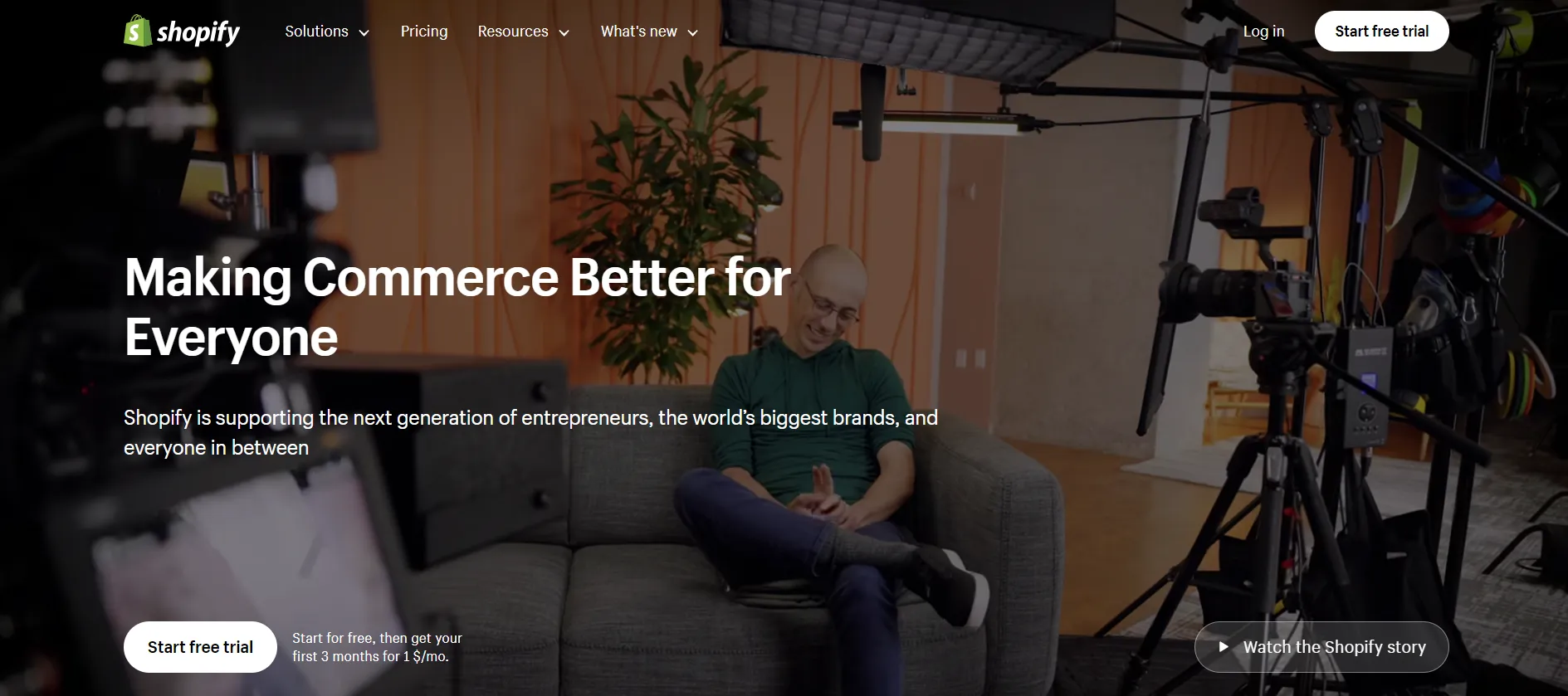
Here are some pros & cons of Shopify that you can read for reference:
Pros | Cons | |

|
|
|
Meanwhile, Ecwid is an eCommerce platform whose main purpose is to help small businesses expand their market. Even though releasing a few years later, its integration capabilities and affordable pricing make it a strong competitor for Shopify.
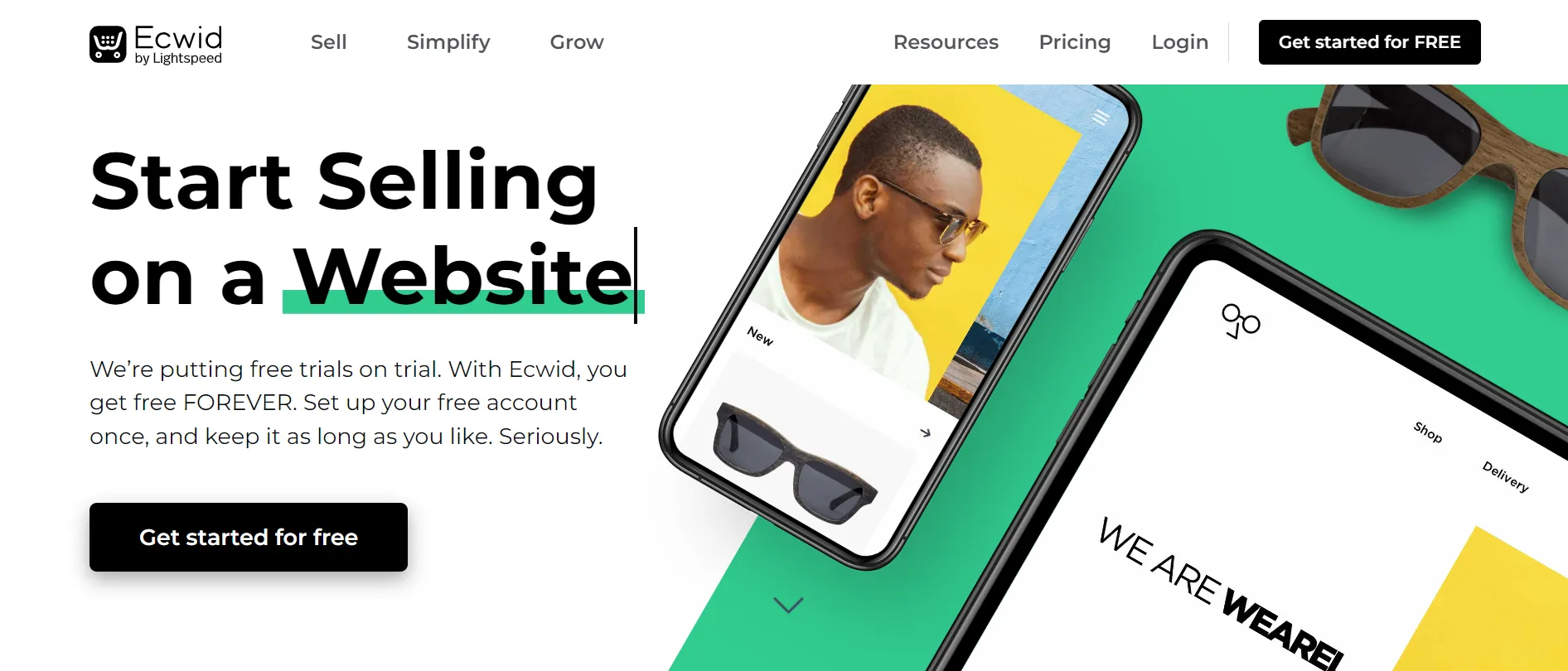
Is Ecwid better than Shopify? Before going into the details, these pros & cons may help you to have an overview of the platform:
Pros | Cons | |

|
|
|
Ecwid vs Shopify: Quick Verdict
Ecwid shines when it comes to integrating seamlessly with your existing website. Whether you're using WordPress, Wix, or another platform, Ecwid can be easily added to provide online selling functionality. This makes it an excellent option for businesses that already have a well-established web presence and want to add an online store.
Quick takeaway: Ecwid is more suitable for small businesses on a budget with basic eCommerce needs.
On the other hand, Shopify is the platform for you if you're looking to build a fully-fledged online store from scratch with extensive customization options. It also offers a robust set of scalable features, thus allowing you to grow your business freely without having to worry about moving to a new platform.
Quick takeaway: Shopify excels for online businesses, both large and small, due to its flexibility, easy management, and robust sales capabilities.
By digging into the nitty gritty of Ecwid vs Shopify, we have concluded that Shopify deserves the crown in this competition. Why do we say that? Let’s review all the functionalities that Ecwid and Shopify offer us.
Features | Shopify | Ecwid | Verdict |
*monthly paid | $5 - $2,500+ | $0 - $105 | Ecwid |
Drag-and-drop design & visual clues | Simple yet visually appealing control panel interface | Ecwid | |
Robust stock management tools | Basic inventory tracking at product level only | Shopify | |
| Square, Clover, Alice | Shopify | |
210+ website templates available | 30+ eCommerce templates | Shopify | |
Popular social platforms & marketplaces | Popular social platforms & marketplaces | A tie | |
|
| Shopify | |
100+ payment options and built-in Shopify Payments | 100+ integrated payment gateways | A tie | |
Requires third-party translation apps & multi-language compatible theme | Built-in translation system to 36 languages | Ecwid | |
8,000+ apps | Less than 500 apps | Shopify | |
Support available to all paid plans | Email, Chat, Phone or Priority support based on pricing tier | Shopify |
#1. Pricing
Quick verdict:
Ecwid might have an edge over Shopify in terms of pricing. Though both platforms offer different pricing plans and features, Ecwid is more affordable overall.
To compare Ecwid vs Shopify pricing, we will examine its plan offers. On Shopify, you can choose from up to 5 pricing packages. On the other hand, Ecwid only provides 3 options with lower costs.
Here are the key differences between the pricing plans on both platforms:
Shopify pricing | Ecwid pricing |
3 days free trial | Free plan |
Shopify Starter Plan ($5/month): Sell on Facebook & connect with customers via Messenger and Buy Button (no standalone store). | Venture Plan ($25/ month): 100 products, mobile inventory management apps, social media integration. |
Basic Shopify Plan ($39/month): Basic tools to start an online business, 2 staff accounts. | Business Plan ($45/month): 2500 products, marketplace integration, 2 staff accounts, abandoned cart recovery, etc. |
Shopify Plan ($105/month): Features for growing business, professional report, gift cards, 5 staff accounts. | Unlimited Plan ($105/month): Unlimited products, Additional POS options, unlimited staff accounts. |
Advanced Shopify Plan ($399/month): Features for scaling business, 15 staff accounts, real-time carrier shipping, advanced report builder. | |
Shopify Plus (from $2500): Complete customization, high volume traffic, Merchant Success Program. |
#2. Ease of Use
Quick verdict:
Ecwid is the winner. With a few clicks, your Ecwid store will be ready to start selling.
First of all, the Ecwid control panel is simple yet visually appealing. Offering various settings, the Ecwid dashboard ensures users follow the wizard's instructions to set up their store.
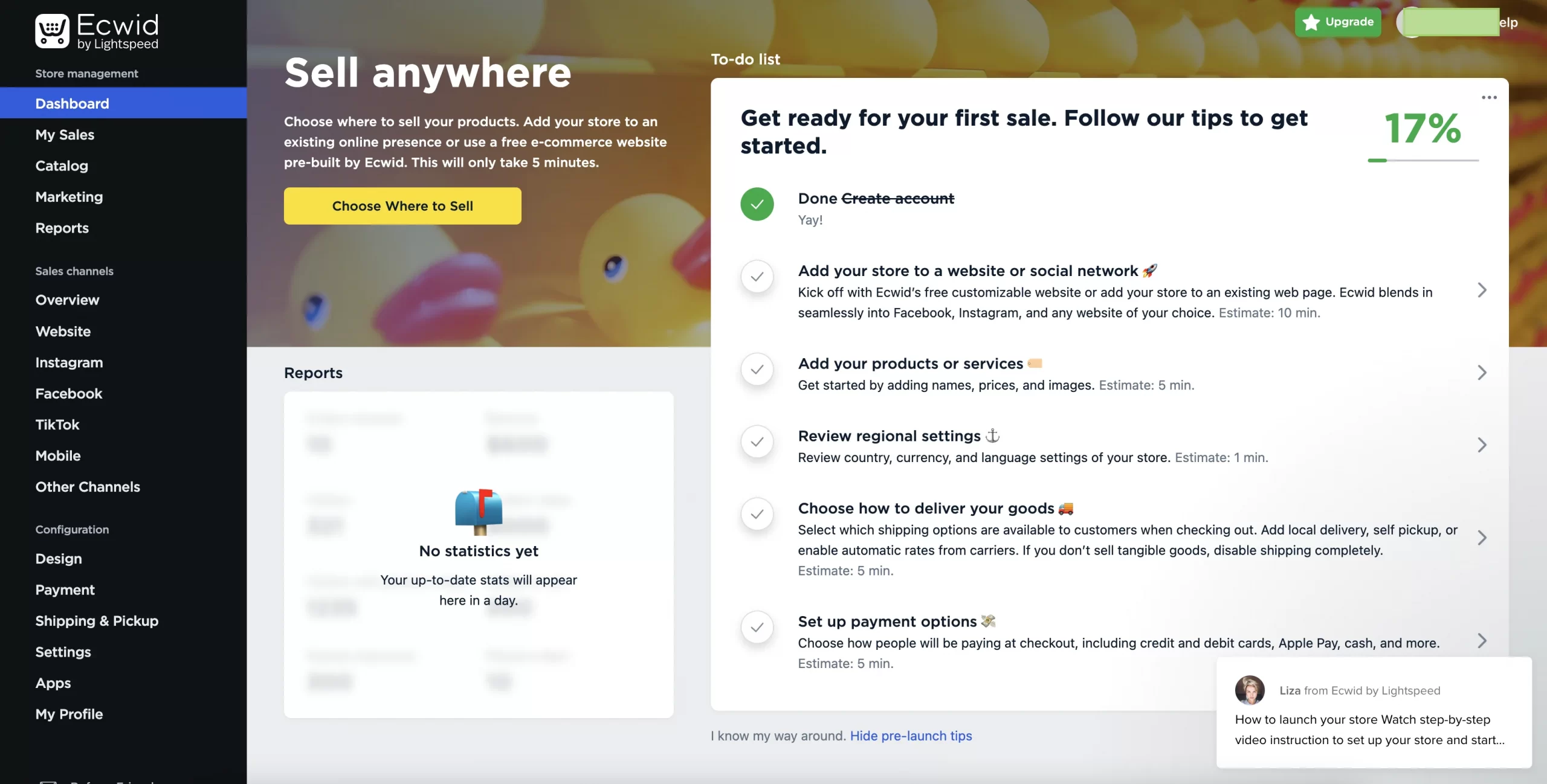
In addition, you can explore other eCommerce features that Ecwid offers from its left-hand sidebar. It is cleverly divided into three sections: Store Management, Sales Channels, and Configuration, which makes it easy to switch between them. You can also upload or manage products by navigating to these menu sections.
Whereas, with Shopify, it takes lots more effort since you're creating an entire online store from scratch. Similarly, it also offers new users a setting-up guide. However, this guide doesn't cover all the steps to launch your Shopify store, such as configuring shipping, which is crucial for selling physical products. Thus, you will have to figure things out on your own.
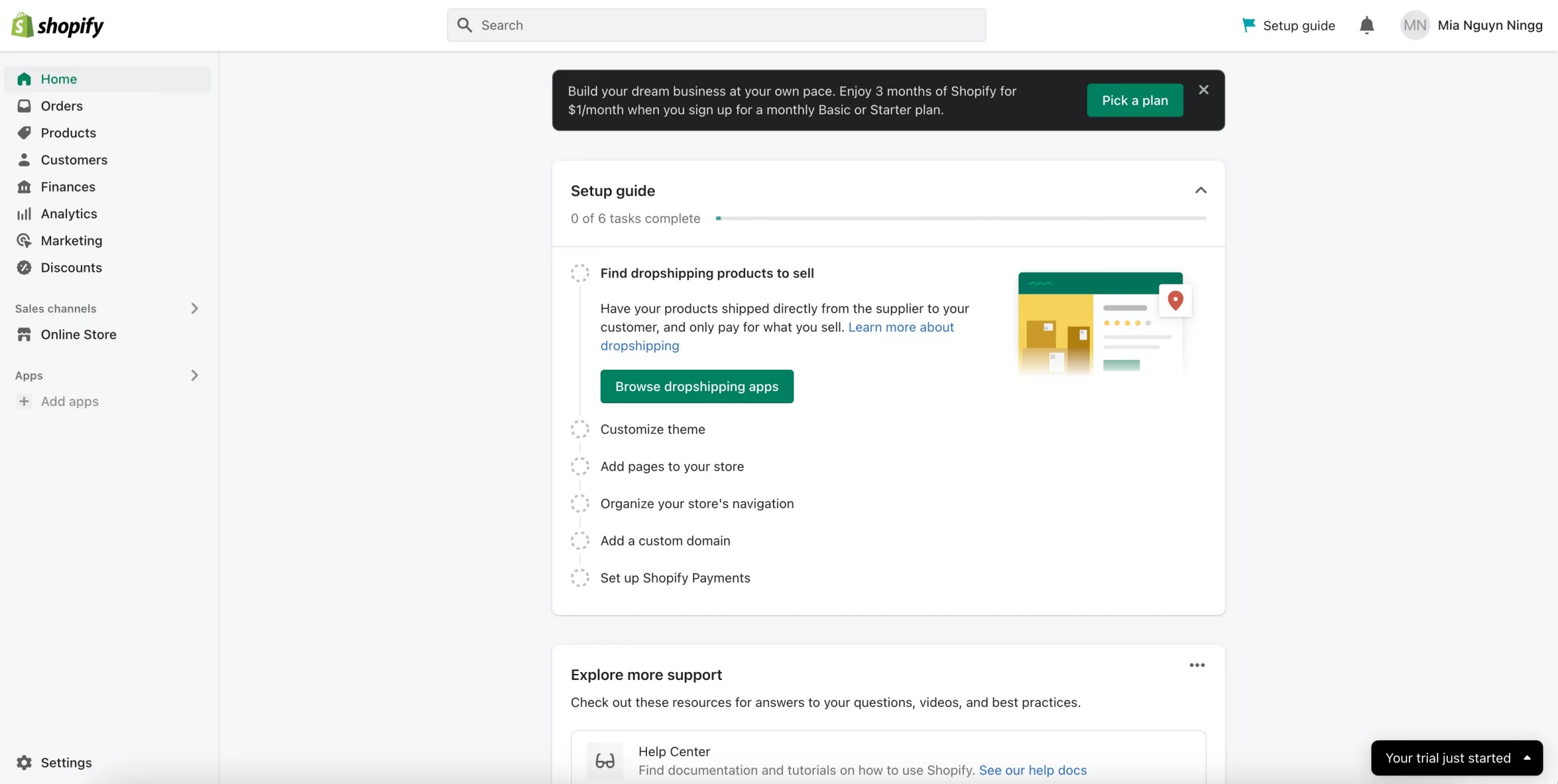
Yet, Shopify will impress any user with its logical structure and endless choice of designs. Whether you are a beginner or a web design expert, you will definitely find joy in the web-building process. It is not only visually appealing but also triggers the urge to keep working with it.
#3. Inventory Management
Quick verdict:
Shopify once again wins in terms of Shopify vs Ecwid inventory management. It packs you with a more fully featured and flexible inventory system for tracking across channels.
Both Ecwid vs Shopify facilitate storeowners with full functionalities to manage sales and supervise their inventory on the go (both for iOS and Android).
With Ecwid, you only access basic inventory tracking at the product level. Though you can track stock quantity, there's no location or variant management. If you are selling across multiple channels, these can be easily managed on your single dashboard.
Now coming to Shopify. This platform offers robust stock management tools for tracking individual item quantities. Users can manage inventory across locations and warehouses. Additionally, Shopify uses the Buy Button to allow store owners to sell products across different marketplaces (more information in this section) and manage them all in Shopify’s control panel.
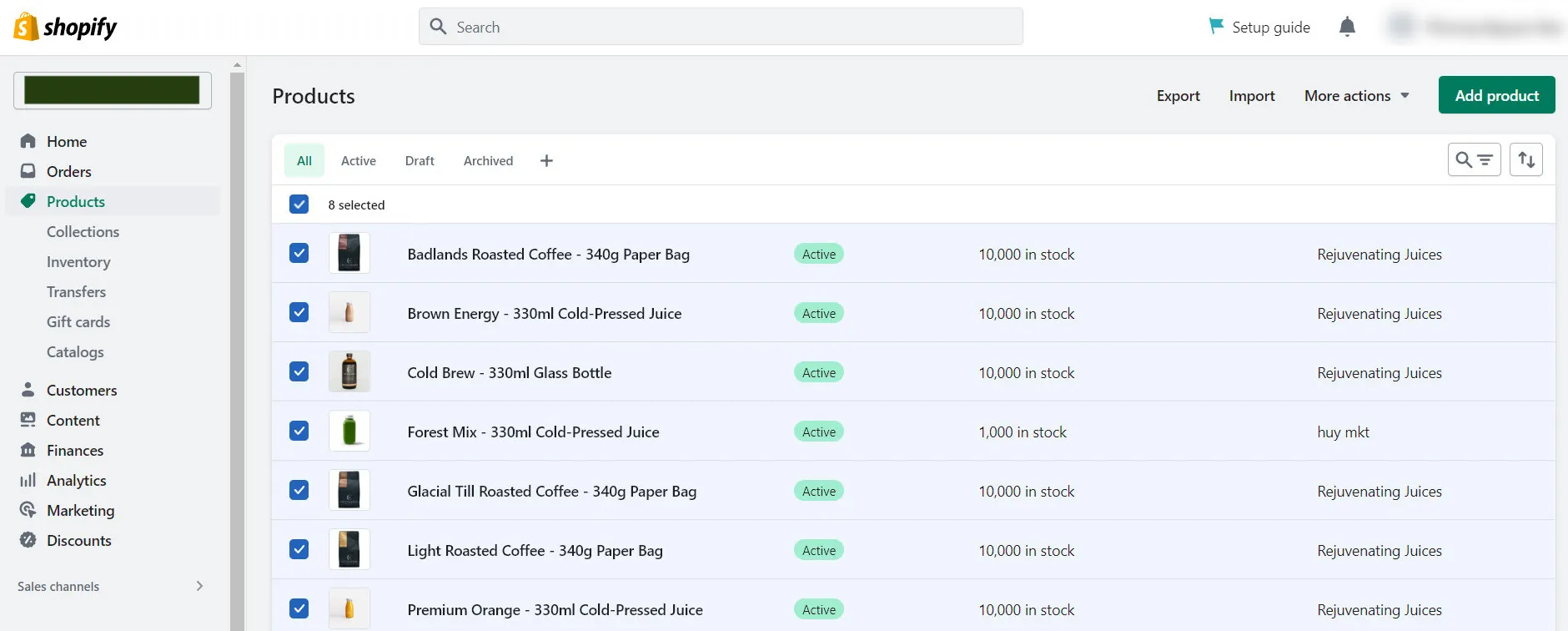
#4. Point of Sale (POS)
Quick verdict:
Shopify wins in Ecwid vs Shopify POS comparison. It provides merchants with more built-in POS features, thus saving the extra costs needed to run both your physical and digital storefronts.
Starting with Ecwid, even though it does offer POS features, these are rather limited. What's more, you need to be on the Ecwid Unlimited plan to access POS. From my viewpoint, it's rather limited, with only 3 options: Square, Clover, and Alice, which are not available in all countries. Hence, you might have to expand your integrations for more POS services.
To compare, Shopify itself has built-in Shopify POS features (Starter and Retail). With Shopify, the POS features are integrated into all paid subscription plans. However, you need to be on the POS Retail Plan ($89/month) to take advantage of POS's full features.
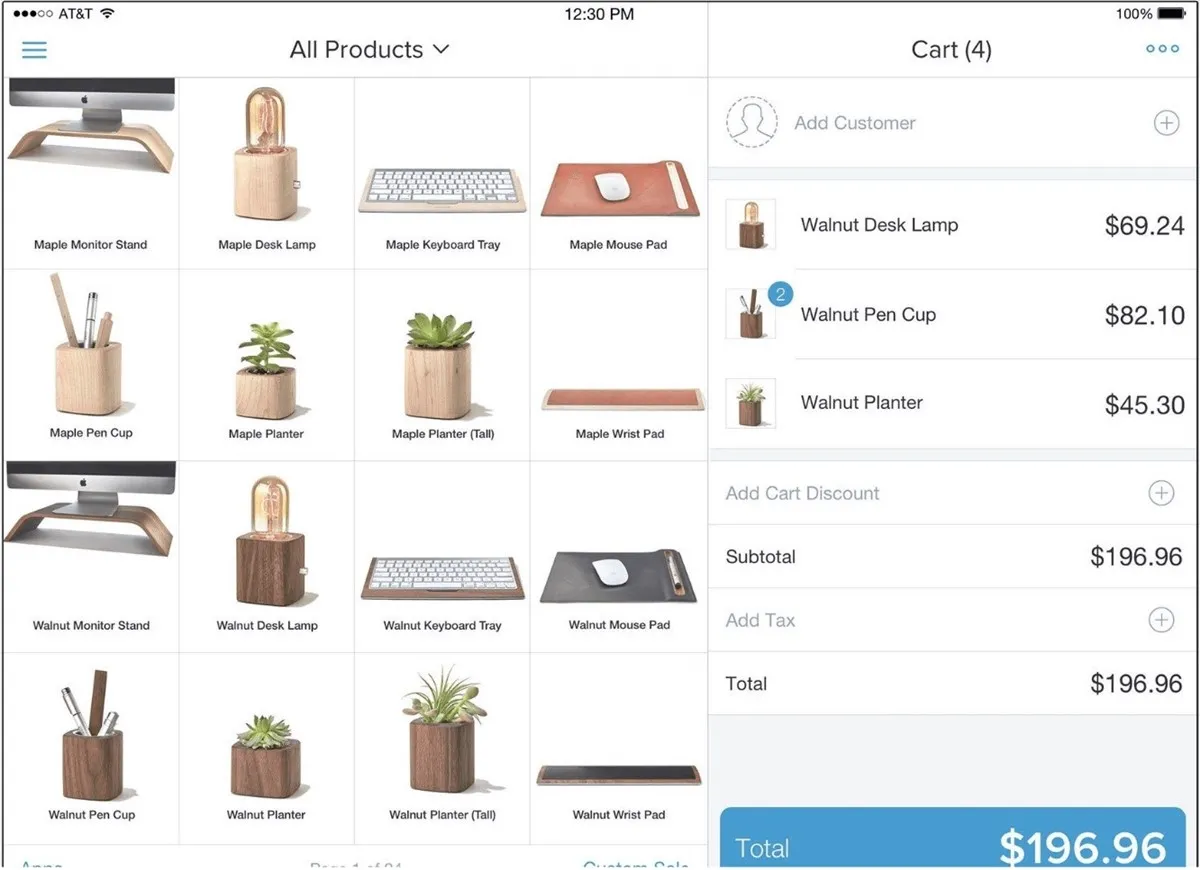
#5. Design & Customization
Quick verdict:
Between Ecwid vs Shopify in this round, Shopify wins overall. We are talking about more themes and customization flexibility.
As I have mentioned above, Ecwid is tailored for merchants who already have their own websites. Therefore, Ecwid has shortened the process as much as possible.
Ecwid doesn't offer a traditional theme selection but provides over 30 customizable templates for their New-Gen Instant Site, many of which are niche-specific. A nice feature is the ability to preview templates before activating them on your store, and the best part is that all templates are entirely free.
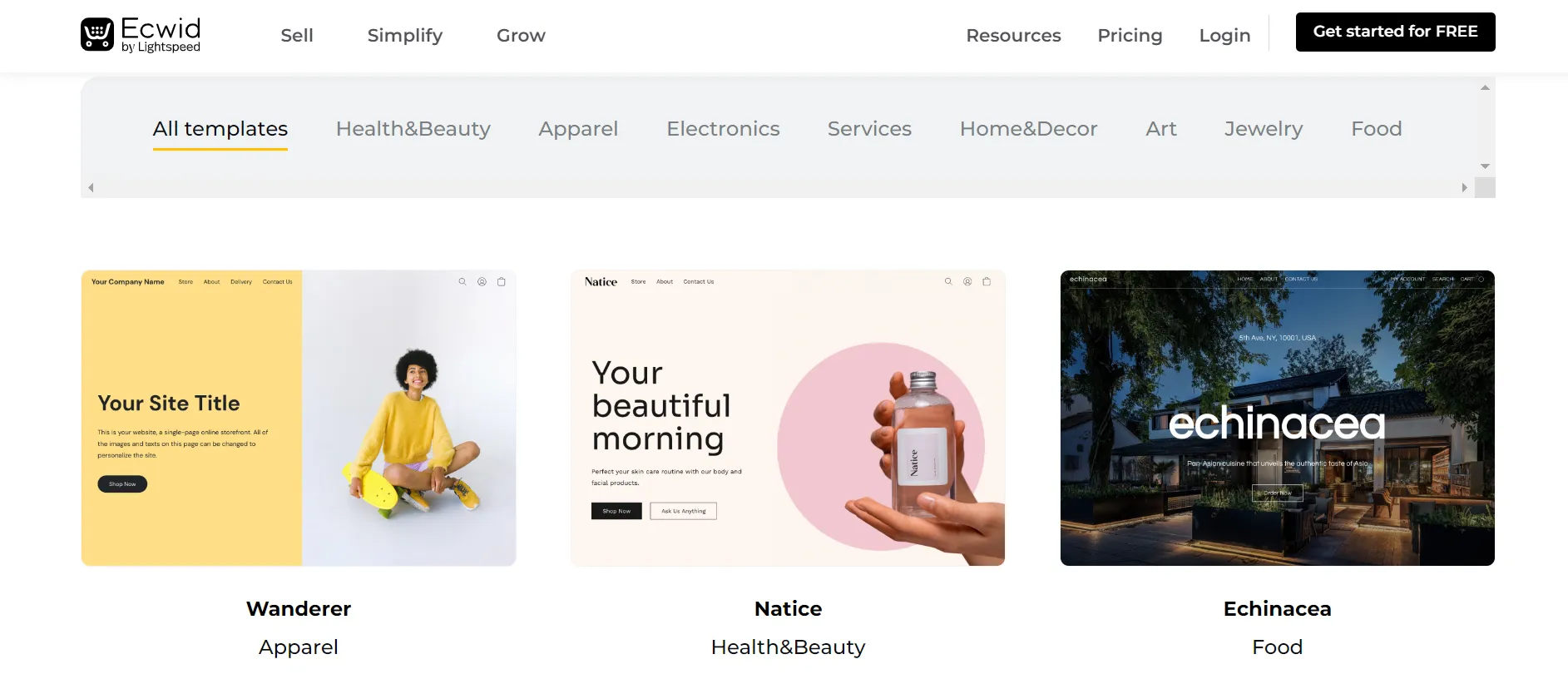
Ecwid features a live theme customizer, a handy tool that uses section-based templates, allowing you to add, remove, and rearrange sections on your page, with a variety of sections to choose from. Nevertheless, this customizer only apply for homepage, which is also its biggest disadvantage.
On the other hand, Shopify is very flexible when it comes to design. There are 210+ website templates available on the Shopify Theme Store. These can cost you anywhere from $0 – $450/theme.
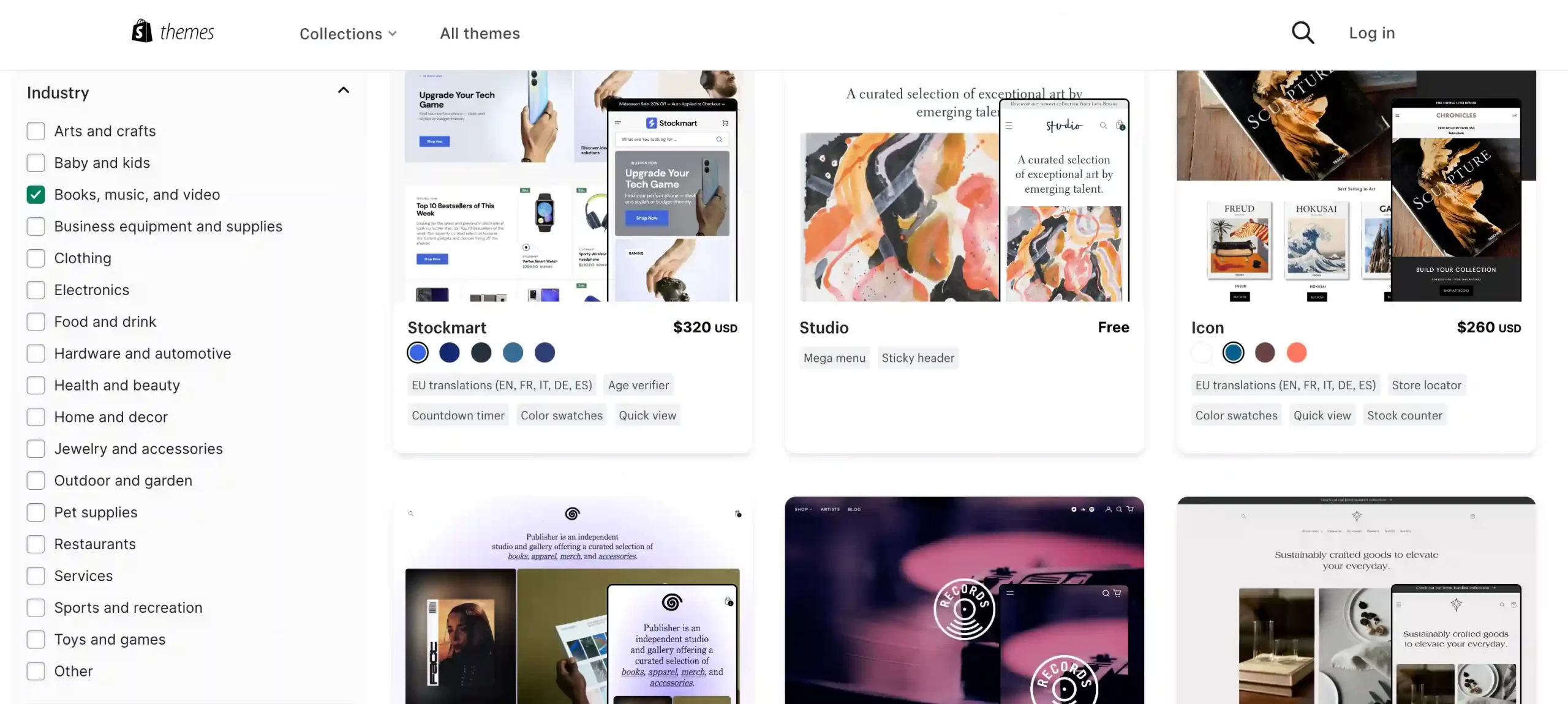
Besides utilizing Shopify's drag-and-drop customization system, you can always add your personal touch through its Liquid code. Thanks to this, you can customize fonts, buttons, and colors by modifying the CSS or HTML source code.
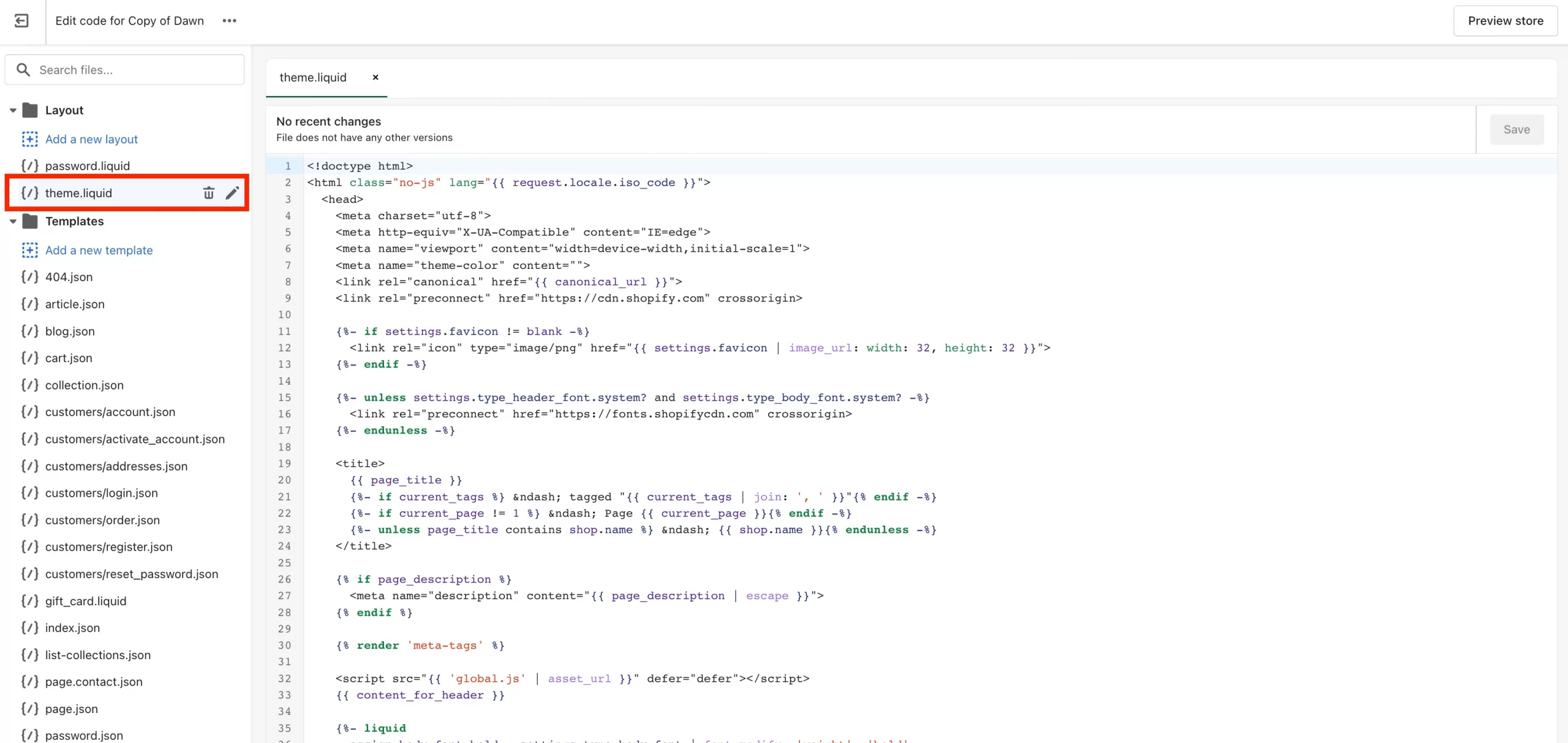
#6. Multiple selling channels
Quick verdict:
It's a draw between Ecwid vs Shopify in multiple selling channel comparison. Both platforms allow you to generate higher sales via a multichannel setup.
Let's first talk about Ecwid. You can expand your current audience base by selling on social media platforms like Facebook and Instagram and even popular marketplaces like Amazon and eBay. However, you need to be on the Venture plan to sell on social platforms (Facebook, Instagram, Messenger) and the Business plan for eBay and Amazon.
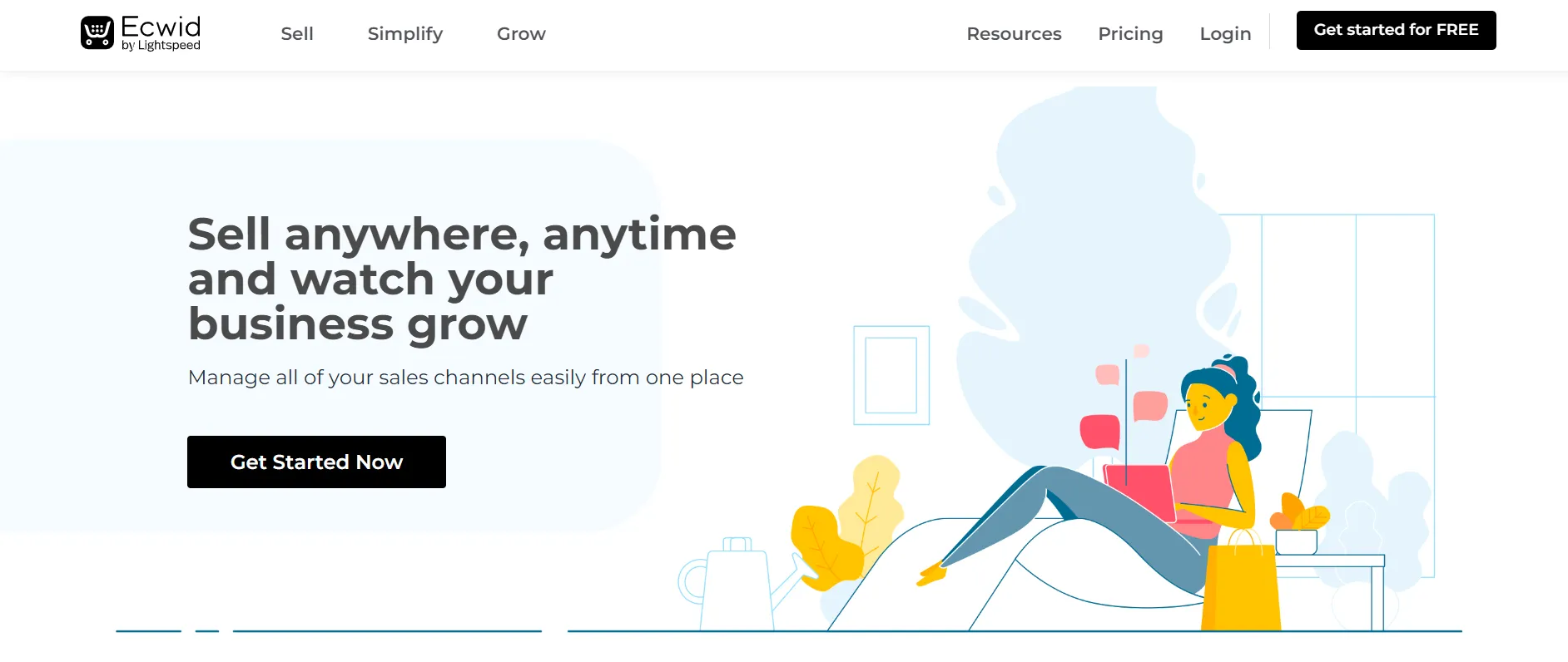
In the meantime, Shopify’s Buy Button allows customers to conduct online purchases on any marketplace, social platform, or other eCommerce platform (Wix, WordPress, Weebly, or Squarespace) without having to visit Shopify’s store.
This is extremely convenient for retailers to boost their sales. Just imagine when customers read a blog on “Why sunscreens are important,” and at the bottom of the blog pops up an excellent 50+++ SPF sunscreen product with that Buy Button; they are very likely to go for it.
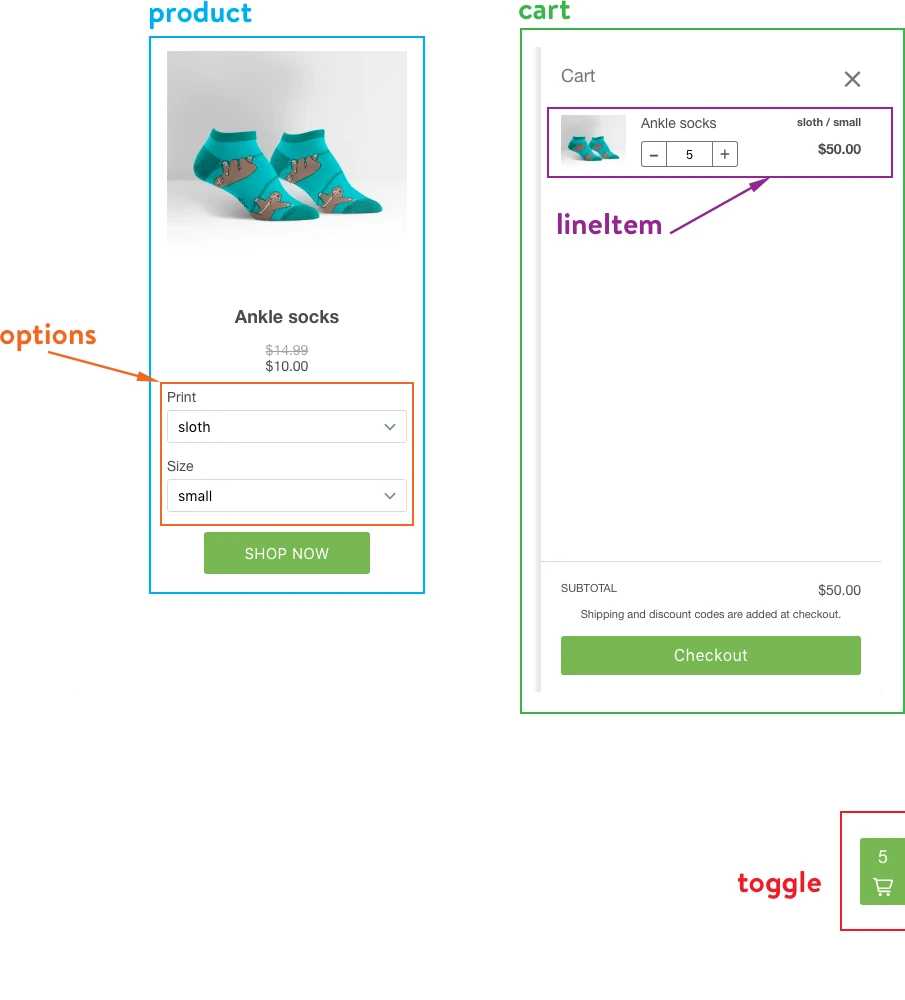
Furthermore, many merchants integrate Shopify into a central platform for better management. This way, you can easily connect your shopping cart with multiple marketplaces such as Shopify Etsy integration or Shopify eBay integration.
#7. SEO & Marketing
Quick verdict:
Shopify takes the trophy in this SEO and marketing competition. It provides all the essential tools and features for online stores to get found and convert visitors into customers.
Mind that online stores launched by Ecwid are considered by the search engines as JS script due to the use of AJAX. Therefore, such platforms are not suitable for standard SEO promotion.
Ecwid has a “Promotion” settings, but it only includes partners-related features such as the Facebook app, external trading platforms, etc. This means Ecwid doesn’t have standard SEO settings for online retailers. With marketing, Ecwid only offers basic email tools that require more robust apps. Its analytics are limited without integrating third-party tools.
On the contrary, Shopify's SEO feature set is generally stunning and favorably compared to other SaaS platforms. Everything on-page SEO in Shopify is easy to manage, from changing titles and meta descriptions to adding headings and alt text.
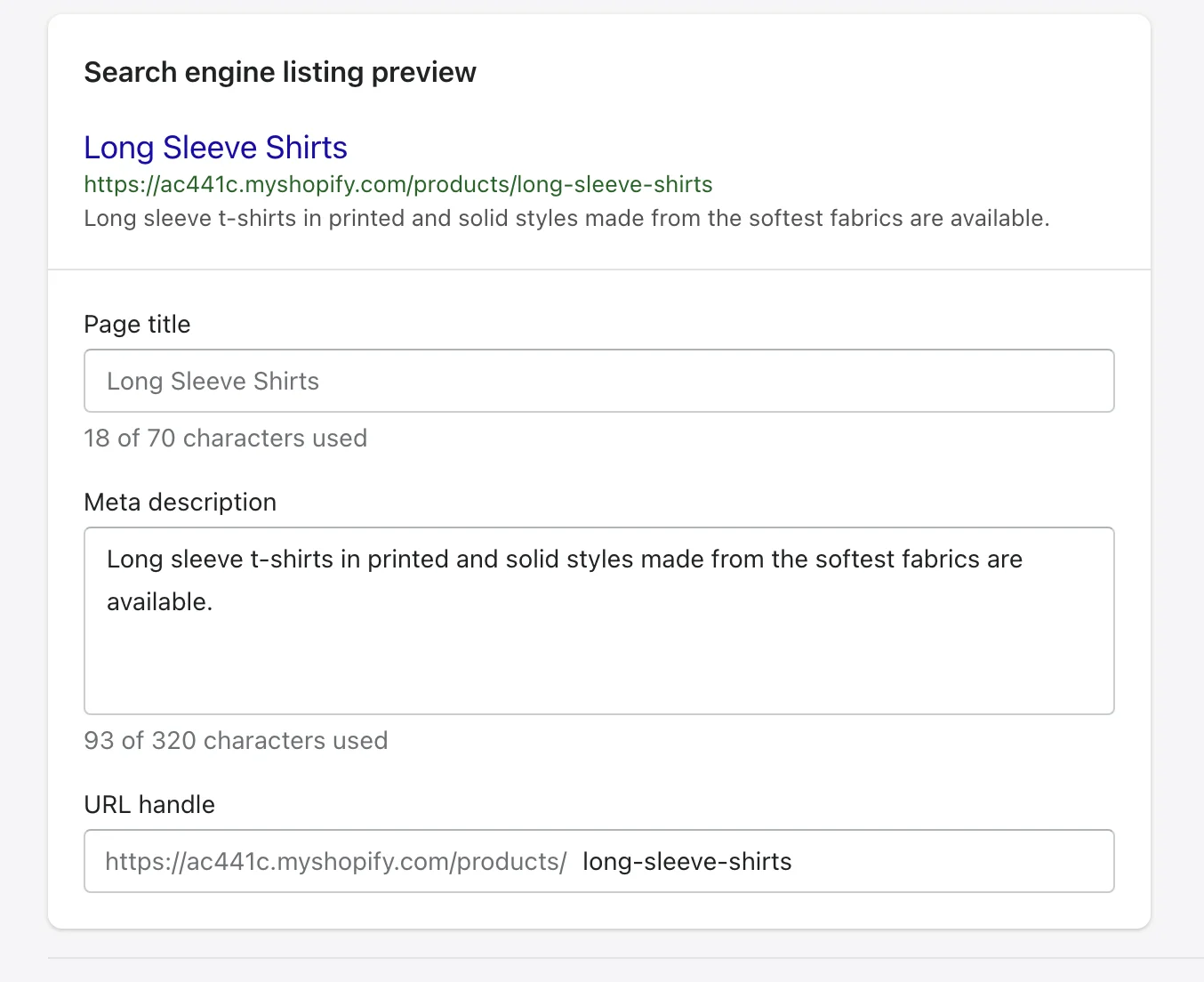
When it comes to email marketing, Shopify makes it simple to set up automated abandoned cart emails and email campaigns. This platform also includes several detailed analytics and reporting options.
#8. Payment options
Quick verdict:
It's a tie. Both platforms offer over 100 payment gateways, allowing you to cater to diverse customer preferences and regional payment habits.
With Ecwid, you can process credit cards with Paypal, one of the top payment gateways, with no extra charge other than Paypal’s fee. Besides, there are about 100 other payment gateways you can connect to Ecwid. Some of the payment gateways are country-specific, so the exact tax and fee will depend on your location.
Shopify also provides more than 100 options in this regard. Specifically, you can use Shopify Payments, which is the in-house payment system. Should you use this method, there are no transaction fees at all, which is excellent. However, there is still a “credit card rate” to consider with the fee (the more expensive the plan, the lower the rate).
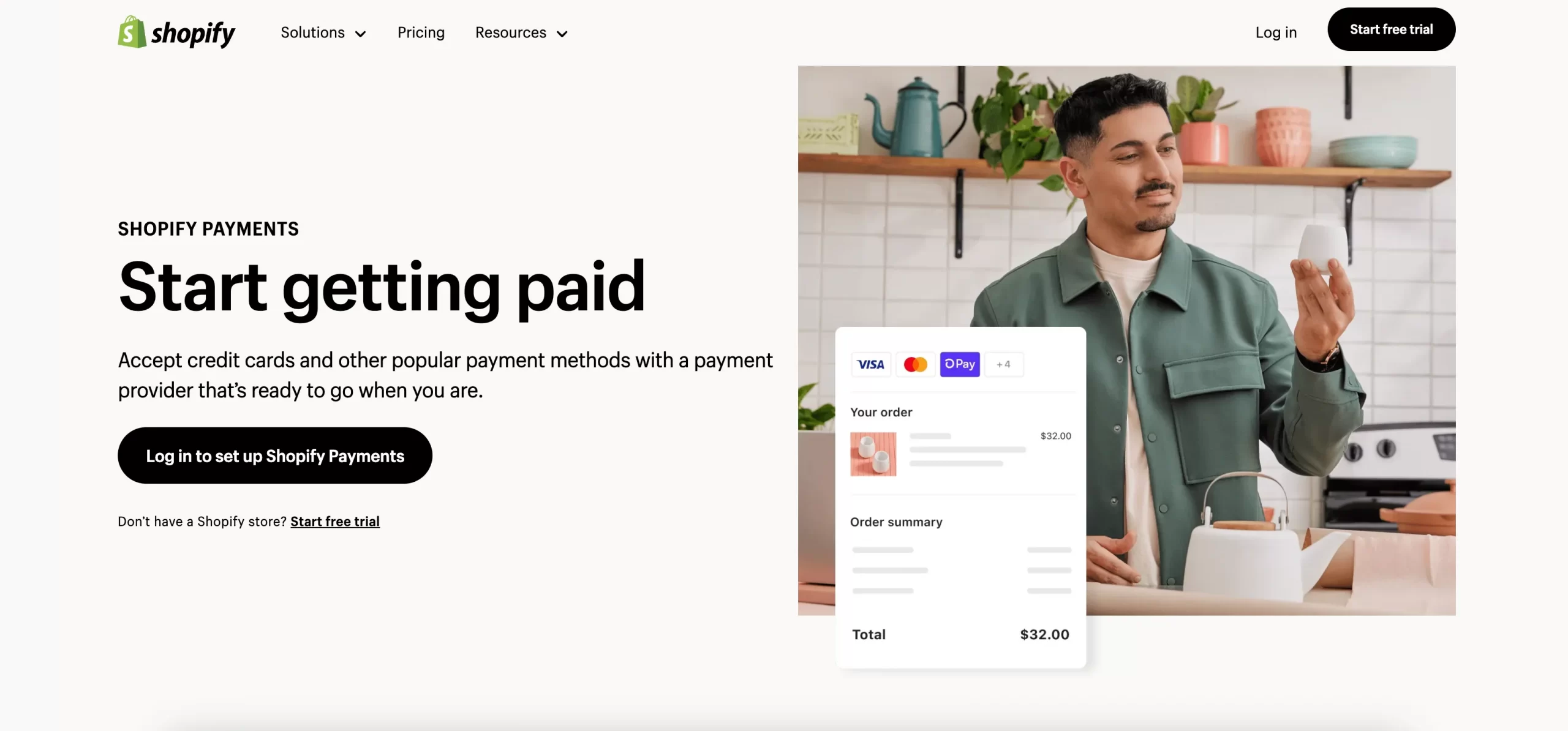
Alternatively, you can use a third-party payment gateway to process card transactions. If you use a payment gateway, bear in mind that Shopify will apply a transaction fee as well.
#9. Internationalization
Quick verdict:
In this language translation competition, Ecwid has a competitive edge. Its built-in multilingual support and user-friendly interface make global selling a breeze.
In terms of language flexibility, due to Ecwid's multilanguage detection and translation ability, you are free to choose among 36 languages to translate your sites, which certainly draws more traffic worldwide. Apart from the built-in translation tool, you can always add custom text translation for your product details, including names, descriptions, variations, options, shipping methods, and more.

Unlike Ecwid, Shopify requires users to install third-party translation apps and a multi-language compatible theme. After adding and publishing a language, customers can browse your website and receive emails and bills in their languages. Langify and Langshop are the only two third-party apps that Shopify supports, which comes with an additional charge.
What's more, Shopify also supports selling to new international markets, which can be done with just a few clicks through Shopify Markets. Through Markets, you can access tools built directly into Shopify to help localize your online store for international customers. This includes translating content, displaying prices in local currencies, and accepting popular local payment methods.
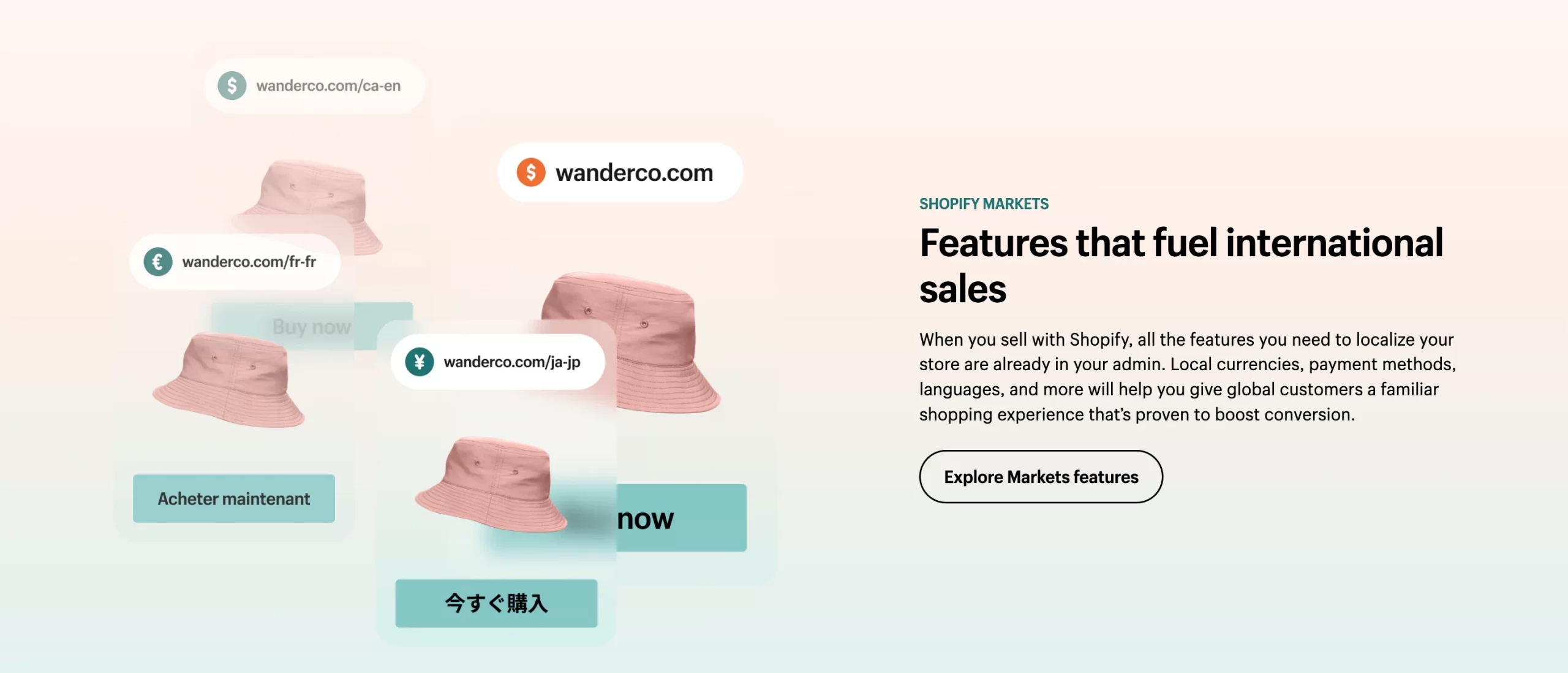
This update from Shopify makes Ecwid vs Shopify international selling competition even fiercer. If not to mention the built-in translation features of Ecwid, we find that Shopify offers a pretty good international selling feature.
#10. Apps
Quick verdict:
Shopify spares more room for development than Ecwid does. You can easily find your suitable integrations from its enormous app store.
Like other eCommerce platforms, Ecwid provides a number of integrations with other web apps, allowing purchases via its App Market. Well-known extensions are arguably limited, but integrations exist with fundamental tools like Mailchimp, Xero, ShipStation, or Taxjar.
By contrast, Shopify is packed with over 13,000 apps which are developed by both in-house teams and third-party developers. From my own viewpoint, Shopify's active development keeps apps bug-free while also delivering ongoing feature improvements based on user feedback.
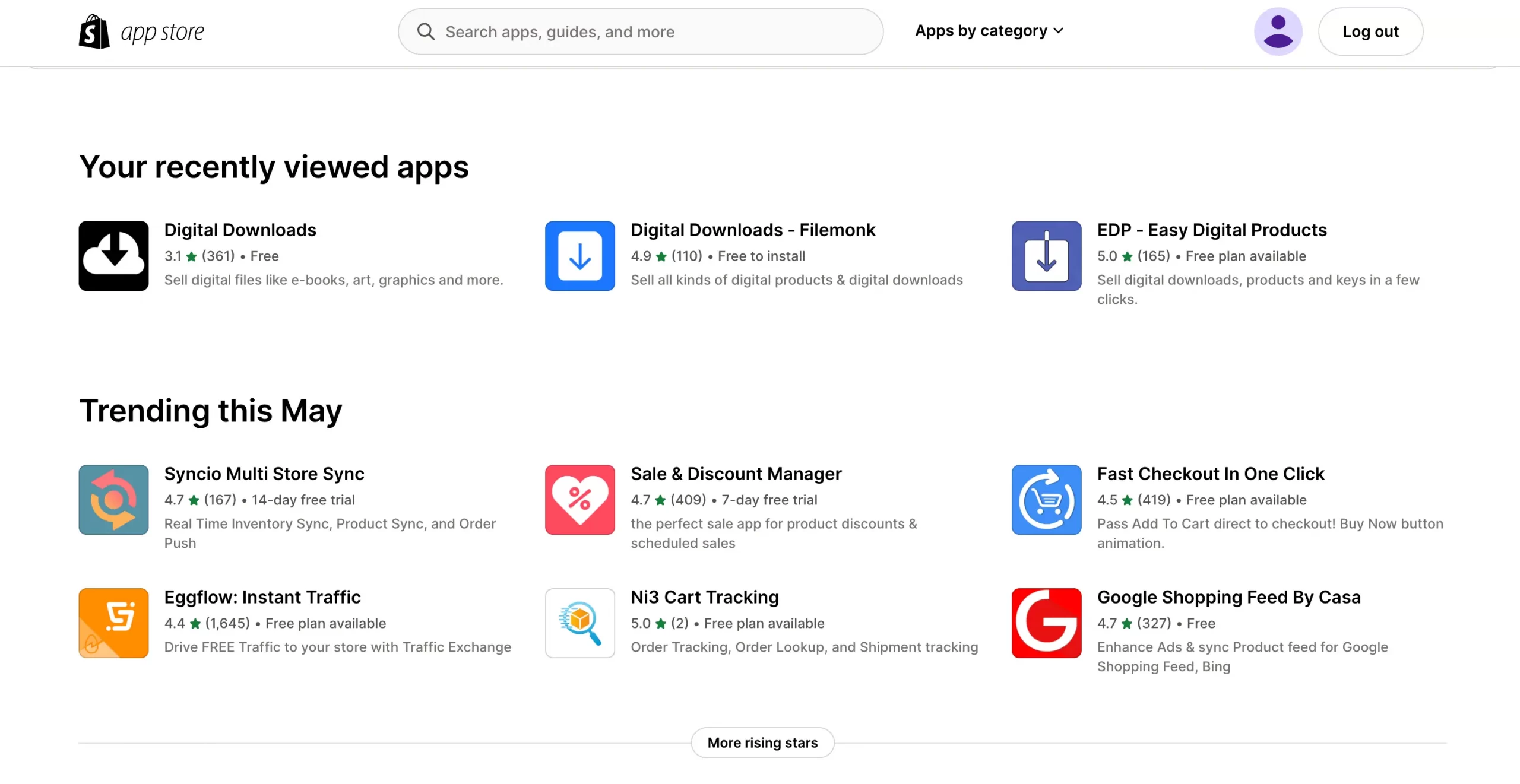
#11. Support
Quick verdict:
The crown goes to Shopify in terms of Ecwid vs Shopify support. Their commitment to 24/7 availability across all paid plans ensures you have the resources to navigate any technical problems.
Ecwid vs Shopify both offer comprehensive customer service. Users are entitled to access email, live chat, or phone support 24/7.
Both platforms provide their own YouTube channel, a blog with a rich selection of educative videos, tips, and FAQs, and a forum filled with thousands of topics related to users’ experience with the platform.
While support is provided for all Shopify’s paid plans, Ecwid’s level of support depends on the type of plan you are on; here are the details:
- Free Plan: Email.
- Venture Plan: Email and live chat.
- Business Plan: Email, live chat, and phone.
- Unlimited Plan: Email, live chat, and priority phone support.
In short, Ecwid only provides full-on support for the Unlimited plan. Meanwhile, Shopify is more generous, with full support available to all paid plans.
Our Methodology – How We Test Ecwid vs Shopify
To provide a clear and trustworthy comparison of Ecwid vs Shopify, we used a hands-on testing approach focused on real business use cases. Rather than relying solely on feature lists, we evaluated how each platform performs in practice across setup, selling, and scaling.
1. Platform setup and onboarding
We signed up for both Ecwid and Shopify, tested the setup process, and evaluated how easily users can start building an online store.
2. Core feature testing
We created demo stores on each platform and tested key eCommerce features like product creation, checkout flow, inventory tracking, discount setup, and shipping configuration.
3. Sales channel and integration testing
We created demo stores on each platform and tested key eCommerce features like product creation, checkout flow, inventory tracking, discount setup, and shipping configuration.
4. Customization and documentation
We reviewed available themes, design tools, and flexibility for branding, both for beginner users and developers needing advanced customization.
5. Support and documentation
We tested the available support channels (chat, email, help centers), response times, and the quality of learning resources provided by both platforms.
6. Pricing and value assessment
We analyzed pricing tiers, included features, hidden costs, and how value scales with business growth for both Ecwid and Shopify.
By following this structured methodology, we aim to present a practical, side-by-side view of Ecwid vs Shopify to help you make an informed decision based on your specific business needs.
Ecwid vs Shopify: FAQs
Is Ecwid as good as Shopify?
Actually, the answer depends. Ecwid is an eCommerce plugin, its main purpose is to help small businesses expand their market. Meanwhile, Shopify is a whole package, a complete solution for your online store to be up and running seamlessly.
What are the downsides of Ecwid?
Some disadvantages of Ecwid are:
- Limited customization options for store themes and templates.
- The lacks catalog organization & product filtering tools.
- Limited SEO capabilities.
Can I switch from Ecwid to Shopify?
Yes, of course. LitExtension offers an excellent migration service from Ecwid to Shopify for you. You can transfer important data, including products, customers, orders, blogs, and other related entities, to Shopify automatically, securely, and accurately.
Which platform is better for a beginner, Shopify or Ecwid?
From our viewpoint, both platforms, Shopify and Evwid, are good for beginners.
Final Words
All in all, in this comparison between Ecwid vs Shopify, both solutions are strong and competitive in the eCommerce market. However, they possess distinct features and purposes.
Hopefully, our article today has helped you decide which platform best fits your business. Our final advice is to consider your budget, technical expertise, growth plans, and target audience when making the final decision.
Should you have any questions regarding Ecwid or Shopify migration, the LitExtension support team is more than happy to help! You can also check out LitExtension blog and join our Facebook Community to gain more eCommerce knowledge.

